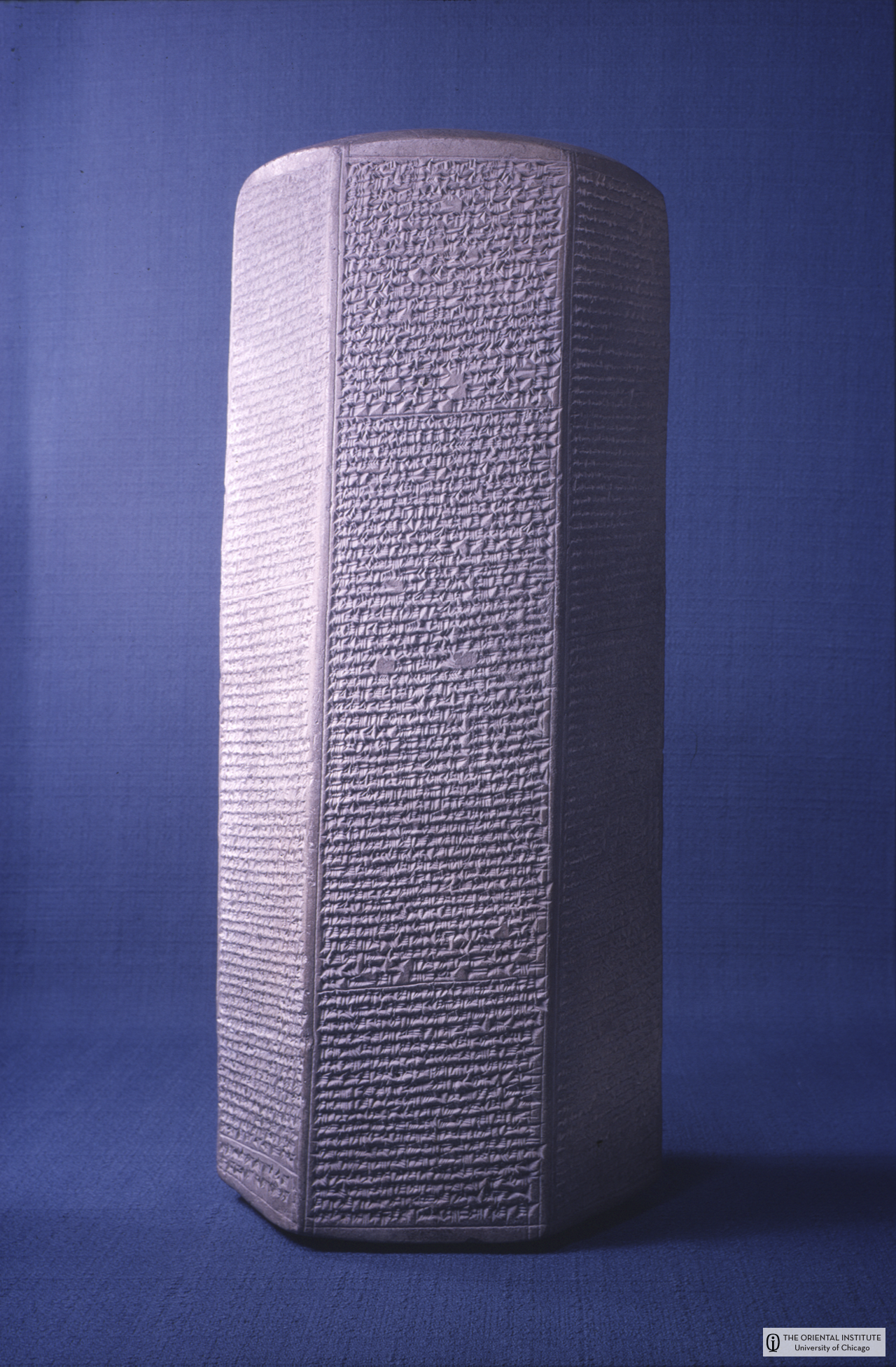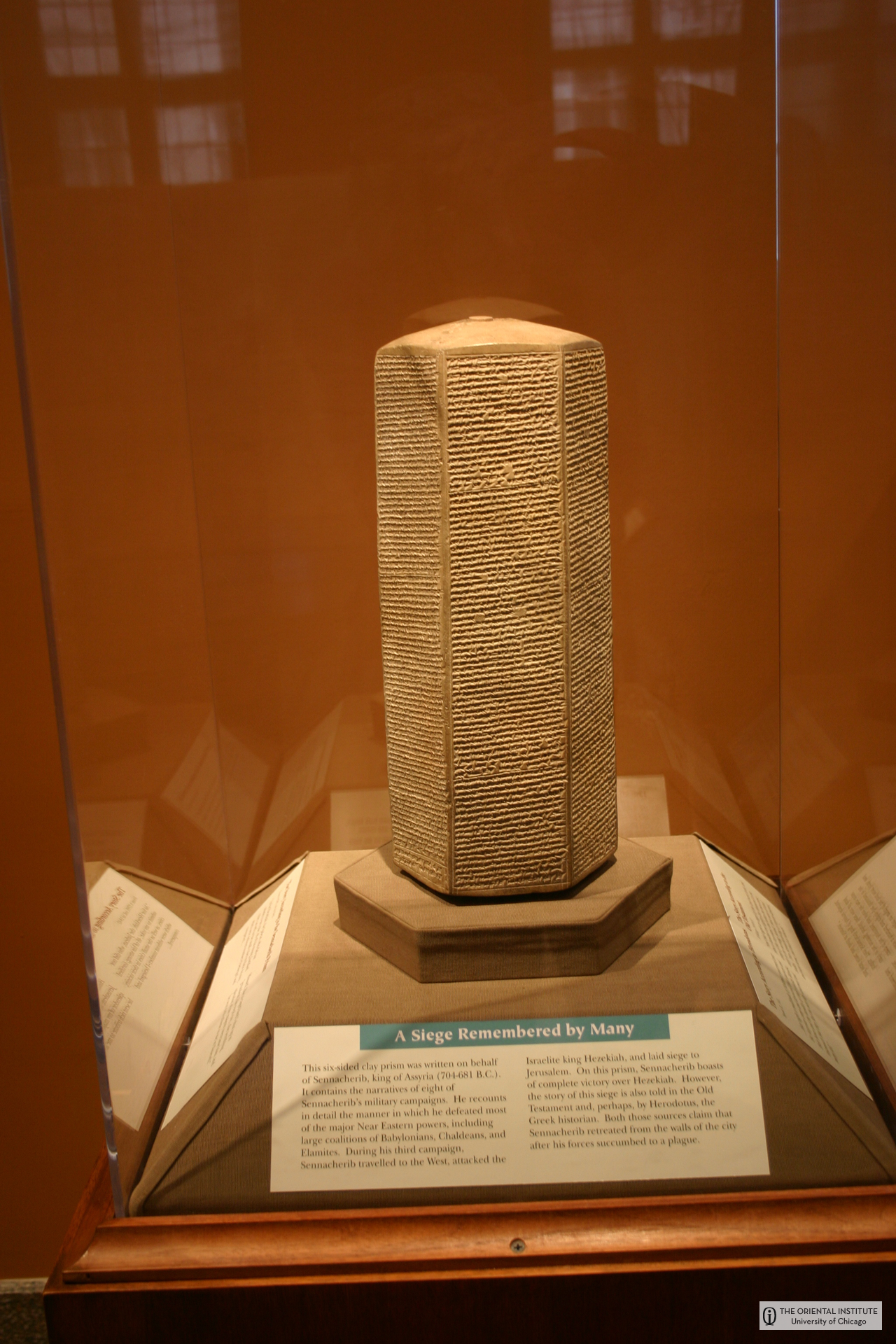Friday Morning
April 9, 1920
I was interrupted in this letter by an appointment to go with the American Consul to see the native dealers. We have at once plunged into the most important finds. We have a six-sided, baked clay prism, 18 inches high bearing the Royal Annals of Sennacherib, valuable Assyrian reliefs, nearly 1000 tablets of literary and similar content, etc., etc., etc. If we can come to terms with the owners, all sorts of legal difficulties and obstacles confront us in securing the right to export the things and take them to America.
 Sennacharib’s prism, now on display in the Oriental Institute Museum
Sennacharib’s prism, now on display in the Oriental Institute Museum
 Sennacharib’s prism, now on display in the Oriental Institute Museum
Sennacharib’s prism, now on display in the Oriental Institute Museum
Friday Afternoon
Hurrah! Luckenbill and I were drinking tea which Abbas had brought up, when in came the cavass from the American Consulate next door, bringing his big registry book and a fat registered letter from you! It is today practically eight weeks since I received the last home letter, and I hope you may never have occasion to know how dismal it is to drop out of the world as I have done, and lose all connection with ones kith and kin. “Like fresh water to a thirsty soul is good news from a far country”. Your letter is numbered fifteen (15), and dated January 27, a Tuesday, the day of the Gogorza concert. It has taken nine and a half weeks to reach me! I hope my letters have not been so long in reaching you. You mention No. 14 as having been sent registered to Cairo. It will doubtless come along soon, and I hope preceded by No. 13, which is all I have not received. No. 12 reached me in Cairo, if my memory is correct, but in cutting down my baggage to the lowest possible limit, I was obliged to leave my file of home letters in Cairo, in my big trunk.
I am sorry I wrote you in my last of any of the insignificant troubles which unavoidably attend an expedition like ours. I don’t believe I could have found a group of fellows more amiable and willing and unselfish than the men I have around me; — It is simply that I grow a little weary sometimes of always being responsible for the details in the arrangement of our immediate future,—details which I might reasonable expect my colleague or the boys to see for themselves and provide for; — but they never do! But Luckenbill is loyal and obliging, and as we have now got down to heavy work with the Asiatic dealers, I am shifting most of it on to his shoulders. I have not read any cuneiform for many years, and I depend entirely on him for the character of the texts, whenever that is not evident from the exterior; but sculptures and similar archaeological objects I select for myself and I find I know them much better than he does. You must not mention to anyone outside of the university, or anywhere where it might reach the press, the things which we have found here. Clay was here only a day or two and succeeded in running down only one small group of things, which however he did not secure. The Civil Commissioner who is practically king of the country, Colonel A. T. Wilson, is an exceptionally strong man; — has very decided views about the proper policy for his treatment of the country, and I fear has such a sensitive regard for what he considers the rights of the Arabs (imagine Arab rights based on their appreciation of cuneiform documents!) that he may not allow us to take out a single thing. But I have a strong weapon against him in that British officers of wealth have already taken out great groups of stuff in their baggage, as their personal collections!
I was invited to dine with the new Commander-in-Chief, General Haldane, last night and found it a very enjoyable meeting. It is all water to our mill and will help us in the future. I had a letter of introduction from Lord Allenby to General MacMunn, the former Commander-in-Chief in Mesopotamia—but on arriving here I found that General MacMunn had been transferred to India, and General Haldane had just come out in his stead. As I had no letter to General Haldane, I was not expecting any opportunity to meet him; — but General Hambro is kindness itself, and I suspect he arranged it. Mrs. Hambro has just gone back to England to her children, and the general is about to shift over for a few weeks to the house of the Commander-in-Chief, in order to let one of the ladies of the English colony who is not well and cannot find proper rooms, have his whole comfortable house until she sails for England, when he will return to it. He is, you see, a man of boundless kind-heartedness, and I am already the recipient of so much kindness at his hands, that I don’t know how to pay my debts. He came into my room this morning with a carbon of the letter he had written to the Anglo-Persian Oil Company, directing them to give us passage in one of their big oil boats around Arabia to Egypt, and thus saved us several thousand miles of the hottest kind of sailing across the Indian Ocean to and from Bombay. The work with the antiquities we have found is preventing our trip to Hît, noted in the above itinerary, and we shall spend the time here, entirely on the job of listing and endeavoring to locate all the available things of value. But I am deeply perplexed as to the proper method of procedure in buying the things and obtaining the right to take them to America.
It is beginning to be very hot here after the first two hours of the morning; — the winter rains of which we have encountered a number, are now probably all past, and the nights are no longer cold, though they are cool and refreshing. The flies are a terrible pest, and the tiny sand flies which go through any mosquito net, are soon due to appear. Curiously enough the flies cannot stand the extreme heat of this region and by the middle of June or even earlier they disappear; but we shall have them as long as we are in the country.
Once we are safely stowed away on board the oil steamer at Basrah, I shall feel as if the second of the labors of Hercules were completed. The first was Egypt, and the third will be Syria. Our next step of 250 miles up the Tigris to Mosul looks to me like a journey round the world. I suppose I am getting tired and travel-weary, just as the armies were war-weary toward the end. But you will have a cable from me long before you read this letter, letting you know that we are leaving Mesopotamia and returning to the Mediterranean. I have had a cable from Nelson at Beyrut, conveying an invitation from the college to deliver the Commencement Address there on June 17. You might call up Fiske at the Press and let him know. He always wants such items for his news column. The invitation, though it involves a responsibility I would gladly have escaped, was peculiarly attractive to me. I have so long worked on the ancient civilizations of these lands of the Near East, that I felt singularly impelled to improve this opportunity of conveying any message that may be in me to the young men from all these venerable lands, who are gathered in such numbers in Beyrut.
For the full story of my exciting trip you should come to the special exhibit “Pioneers to the Past: American Archaeologists in the Middle East, 1919-1920,” at the Oriental Institute!
1155 East 58th Street Chicago, IL 60637
Hours:
- Tuesday 10:00 am to 6:00 pm
- Wednesday 10:00 am to 8:30 pm
- Thursday 10:00 am to 6:00 pm
- Friday 10:00 am to 6:00 pm
- Saturday 10:00 am to 6:00 pm
- Sunday noon to 6:00 pm
- Closed Mondays
http://oi.uchicago.edu/museum/special/pioneer/
And visit me on facebook at: http://www.facebook.com/profile.php?id=3318774#/profile.php?v=info&ref=profile&id=100000555713577